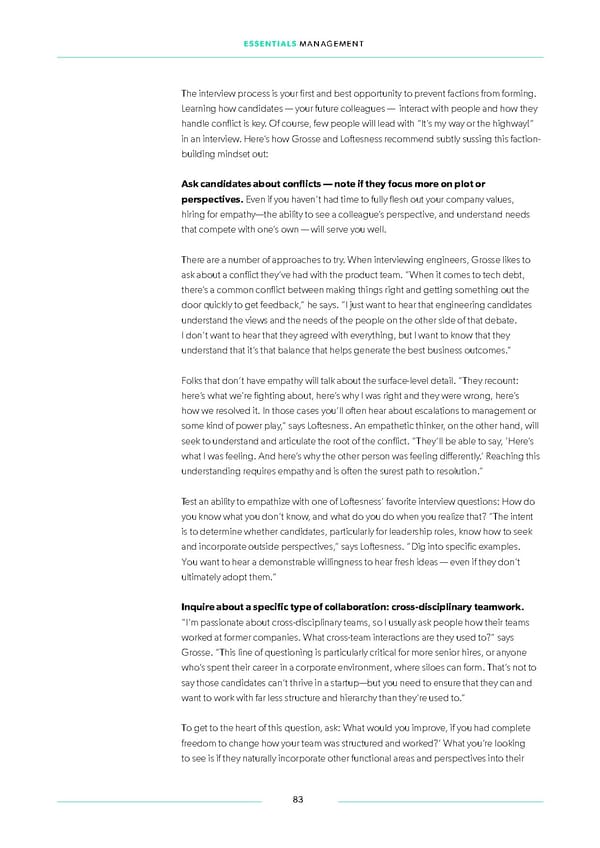ESSENTIALS MANAGEMENT The interview process is your ifrst and best opportunity to prevent factions from forming. Learning how candidates — your future colleagues — interact with people and how they handle conlfict is key. Of course, few people will lead with “It’s my way or the highway!” in an interview. Here’s how Grosse and Lotfesness recommend subtly sussing this faction- building mindset out: Ask candidates about conlficts — note if they focus more on plot or perspectives. Even if you haven’t had time to fully lfesh out your company values, hiring for empathy—the ability to see a colleague’s perspective, and understand needs that compete with one’s own — will serve you well. There are a number of approaches to try. When interviewing engineers, Grosse likes to ask about a conlfict they’ve had with the product team. “When it comes to tech debt, there’s a common conlfict between making things right and getting something out the door quickly to get feedback,” he says. “I just want to hear that engineering candidates understand the views and the needs of the people on the other side of that debate. I don’t want to hear that they agreed with everything, but I want to know that they understand that it’s that balance that helps generate the best business outcomes.” Folks that don’t have empathy will talk about the surface-level detail. “They recount: here’s what we’re ifghting about, here’s why I was right and they were wrong, here’s how we resolved it. In those cases you’ll otfen hear about escalations to management or some kind of power play,” says Lotfesness. An empathetic thinker, on the other hand, will seek to understand and articulate the root of the conlfict. “They’ll be able to say, ‘Here’s what I was feeling. And here’s why the other person was feeling differently.’ Reaching this understanding requires empathy and is otfen the surest path to resolution.” Test an ability to empathize with one of Lotfesness’ favorite interview questions: How do you know what you don’t know, and what do you do when you realize that? “The intent is to determine whether candidates, particularly for leadership roles, know how to seek and incorporate outside perspectives,” says Lotfesness. “Dig into speciifc examples. You want to hear a demonstrable willingness to hear fresh ideas — even if they don’t ultimately adopt them.” Inquire about a speciifc type of collaboration: cross-disciplinary teamwork. “I’m passionate about cross-disciplinary teams, so I usually ask people how their teams worked at former companies. What cross-team interactions are they used to?” says Grosse. “This line of questioning is particularly critical for more senior hires, or anyone who’s spent their career in a corporate environment, where siloes can form. That’s not to say those candidates can’t thrive in a startup—but you need to ensure that they can and want to work with far less structure and hierarchy than they’re used to.” To get to the heart of this question, ask: What would you improve, if you had complete freedom to change how your team was structured and worked?’ What you’re looking to see is if they naturally incorporate other functional areas and perspectives into their 83
 Essentials Management First Round Capital Page 82 Page 84
Essentials Management First Round Capital Page 82 Page 84